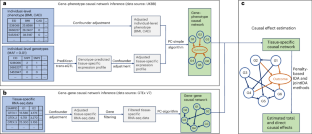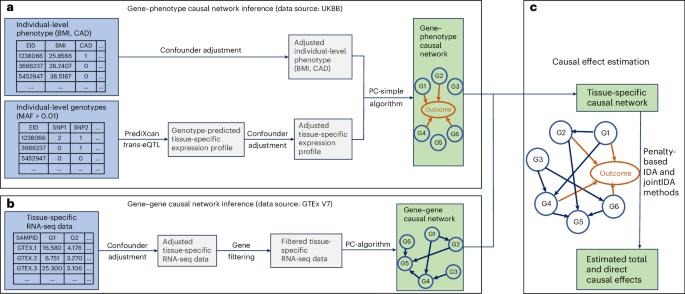使用基于贝叶斯网络的框架估算基因对复杂性状的因果效应,并将其应用于 GWAS 数据
IF 18.8
1区 计算机科学
Q1 COMPUTER SCIENCE, ARTIFICIAL INTELLIGENCE
引用次数: 0
摘要
破译基因与复杂性状之间的关系可以加深我们对表型变异和疾病机理的理解。然而,确定单个基因的具体作用并量化它们对复杂性状的直接和间接因果效应仍然是一项重大挑战。在这里,我们提出了一个框架(称为贝叶斯网络全基因组关联研究(BN-GWAS))来解读单个基因的总体和直接因果效应。贝叶斯网络全基因组关联研究(BN-GWAS)利用来自全基因组关联研究的估算表达谱和来自参考数据集的原始表达数据构建有向基因-基因-表型因果网络。它允许在不同样本中评估基因表达和疾病性状,大大提高了该方法的灵活性和适用性。它可以扩展到解密两个或更多性状的联合因果网络,并表现出很高的特异性和精确性(阳性预测值),因此特别适用于选择基因进行后续研究。我们对英国生物库中 14 种组织的 52 个性状进行了大量模拟和应用,验证了 BN-GWAS 的可行性和有效性,揭示了这些性状的基因结构,包括直接、间接和中介因果基因的相对贡献。确定的(直接)因果基因明显富集于开放目标数据库中突出显示的基因。总之,BN-GWAS 为通过系统级因果推断方法阐明复杂性状的遗传基础提供了一个灵活而强大的框架。本文章由计算机程序翻译,如有差异,请以英文原文为准。


Estimation of causal effects of genes on complex traits using a Bayesian-network-based framework applied to GWAS data
Deciphering the relationships between genes and complex traits can enhance our understanding of phenotypic variations and disease mechanisms. However, determining the specific roles of individual genes and quantifying their direct and indirect causal effects on complex traits remains a significant challenge. Here we present a framework (called Bayesian network genome-wide association studies (BN-GWAS)) to decipher the total and direct causal effects of individual genes. BN-GWAS leverages imputed expression profiles from GWAS and raw expression data from a reference dataset to construct a directed gene–gene–phenotype causal network. It allows gene expression and disease traits to be evaluated in different samples, significantly improving the flexibility and applicability of the approach. It can be extended to decipher the joint causal network of two or more traits, and exhibits high specificity and precision (positive predictive value), making it particularly useful for selecting genes for follow-up studies. We verified the feasibility and validity of BN-GWAS by extensive simulations and applications to 52 traits across 14 tissues in the UK Biobank, revealing insights into their genetic architectures, including the relative contributions of direct, indirect and mediating causal genes. The identified (direct) causal genes were significantly enriched for genes highlighted in the Open Targets database. Overall, BN-GWAS provides a flexible and powerful framework for elucidating the genetic basis of complex traits through a systems-level, causal inference approach. Genome-wide association studies generate extensive data, but interpreting these data remains challenging. A Bayesian-network-based method is presented that uses imputed and raw gene expression data to decipher the causal effects of individual genes.
求助全文
通过发布文献求助,成功后即可免费获取论文全文。
去求助
来源期刊

Nature Machine Intelligence
Multiple-
CiteScore
36.90
自引率
2.10%
发文量
127
期刊介绍:
Nature Machine Intelligence is a distinguished publication that presents original research and reviews on various topics in machine learning, robotics, and AI. Our focus extends beyond these fields, exploring their profound impact on other scientific disciplines, as well as societal and industrial aspects. We recognize limitless possibilities wherein machine intelligence can augment human capabilities and knowledge in domains like scientific exploration, healthcare, medical diagnostics, and the creation of safe and sustainable cities, transportation, and agriculture. Simultaneously, we acknowledge the emergence of ethical, social, and legal concerns due to the rapid pace of advancements.
To foster interdisciplinary discussions on these far-reaching implications, Nature Machine Intelligence serves as a platform for dialogue facilitated through Comments, News Features, News & Views articles, and Correspondence. Our goal is to encourage a comprehensive examination of these subjects.
Similar to all Nature-branded journals, Nature Machine Intelligence operates under the guidance of a team of skilled editors. We adhere to a fair and rigorous peer-review process, ensuring high standards of copy-editing and production, swift publication, and editorial independence.
 求助内容:
求助内容: 应助结果提醒方式:
应助结果提醒方式:


